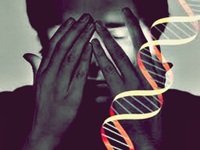Depression May Originate in Our Genes
 Once controversial, new research increasingly backs the notion that the seeds of depression lie in our genes. It's an insight that carries widespread implications for everything from treatment to insurance coverage.
Once controversial, new research increasingly backs the notion that the seeds of depression lie in our genes. It's an insight that carries widespread implications for everything from treatment to insurance coverage.
A decade of experience with new anti-depressant drugs like Prozac has persuaded even the most staunchly Freudian of mental-health providers that depression is strongly rooted in our personal biology.
It has become accepted wisdom that some of us are born inherently prone to periods of dark and despondent feelings, no matter what our later life experiences, while others are armed to be psychologically more resilient. Now, scientists are increasingly confident that those biological differences are driven by specific genes.
The new research paradigm beginning to emerge aims to identify the potentially numerous and different genes believed to be involved in depression. Scientists then hope to figure out which of these genes play pivotal roles in a person's individual mental makeup and how life experiences conspire to trigger the disease.
Indeed, identifying the precise genes at work in depression has become one of the most sought after scientific prizes being pursued by genome researchers, partly because of how widespread depression is. The World Health Organization recently said depression is the fourth-leading cause of disease burden, which is defined as years patients must live with a disability. The WHO figures about 121 million people world-wide suffer from depression, and it estimates that depression will become the primary cause of disease burden world-wide by the year 2020.
Two studies reported this month help reinforce this emerging depression dogma. One report, from an international team led by University of Wisconsin researchers, offers reasons some people may be psychologically sturdier than others. Another report, from researchers at the University of Pittsburgh Medical Center, shows how scientists exploiting sophisticated new gene-hunting techniques are unmasking the precise genes that may help strengthen the argument that depression is a gene-based condition.
Wisconsin scientists and colleagues in Great Britain and New Zealand looked at how inheriting variations of one particular gene affected people's susceptibility to depression. The gene, called 5-HTT, is the focus of much scientific interest because it helps regulate the action of serotonin, one of several chemical neurotransmitters that carry signals between brain cells. Prozac-like drugs work by increasing the amount of serotonin that resides in between such cells, a change that apparently improves a person's ability to manage stressful feelings.
 Recent research by the group and others found that some people inherit at least one short version of the 5-HTT gene, while others carry two longer versions. (Each of us inherits two copies of every gene, one from each parent. It is believed the protein chemicals made by a gene are often influenced by the makeup of both copies.)
Recent research by the group and others found that some people inherit at least one short version of the 5-HTT gene, while others carry two longer versions. (Each of us inherits two copies of every gene, one from each parent. It is believed the protein chemicals made by a gene are often influenced by the makeup of both copies.)
Researchers looked at the mental-health status of 847 adult New Zealanders who experienced four traumatic events, such as a death, divorce or job loss, over a five-year period. They compared the behavior of those with one or two copies of the short version of the gene with those who had two copies of the long version. Only 17% of those with two copies of the long variant were diagnosed with depression, while 33% of those with the one or two of the short variants became depressed. Indeed, double-short-gene people were three times more likely to attempt or commit suicide than those with the long version.
Researchers in Pittsburgh used a different approach to unmask another susceptibility gene. Led by George Zubenko, the group looked at the DNA recently collected from 81 families in which a recurrent and major form of depression had been identified over many years of study. By scanning the family members' entire genome -- made easier because of new gene-sequencing data resulting from the human genome project -- the scientists found 19 different genetic regions that may contain genes involved in depression. The DNA sequences of those with a history of illness were consistently different in the 19 regions than the DNA sequences from the same areas taken from relatives who were disease free.
Unlike the gene-specific findings of the Wisconsin-led team, the Pittsburgh research may take many years to resolve. That's because the initial discovery suggests the disease may result from an interplay of some still-mysterious genes that reside within the 19 different DNA sites, Dr. Zubenko says.
However, Dr. Zubenko says, at least one gene, CREB1, by itself might not affect mental health but may regulate the activity of many of the other genes. Instead, Dr. Zubenko believes but has yet to prove, certain versions of CREB1 control the function of the other genes that likely make one more or less prone to depression and other mental-health maladies.
Like so many gene-based findings these days, the two new reports must be confirmed by others. In both instances, it will be years before the research leads to some practical applications. It may never make sense, ethically or medically, to use these and other gene findings to identify who among us is biologically at risk and who isn't.
But, right away, these studies indicate that genes are strongly associated with depression. That, in itself, is causing a major shift in how the disease is being studied. More and more, depression will be viewed as a biology-based medical disease that happens to affect the mind, much as diabetes affects the heart and kidneys, or arthritis affects the joints, rather than a psychological lapse within an individual's control.
Finding the biological underpinnings of depression is likely also to have a widespread impact on the economics of the disease. One of the most controversial aspects of mental health is that insurance plans rarely cover treatment for depression on the same basis as other health problems. Advocates for improved mental-health coverage are certain to use these scientific insights to argue that coverage ought to be more generous than it currently is.
Source: Wall Street Journal, Michael Waldholz
next: 5-HTP and the Serotonin Connection
~ depression library articles
~ all articles on depression
APA Reference
Staff, H.
(2003, July 31). Depression May Originate in Our Genes, HealthyPlace. Retrieved
on 2026, January 13 from https://www.healthyplace.com/depression/articles/depression-may-originate-in-our-genes



